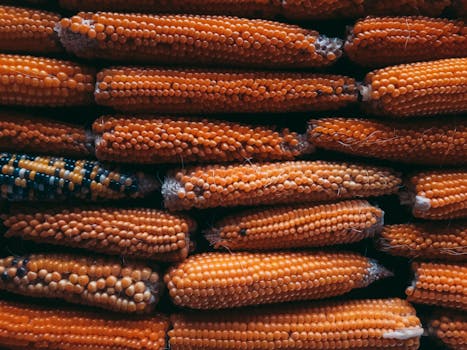
India's Ethanol Push: Will Maize Surge at the Expense of Oilseed Production?
India, the world's largest importer of edible oils, faces a potential crisis as farmers increasingly shift from oilseed crops to maize, driven by the government's ambitious ethanol blending program. This shift could significantly impact domestic oilseed production, leading to increased reliance on imports and potentially exacerbating inflationary pressures on cooking oil prices. The implications extend beyond just food security, touching upon the country's agricultural economy and its global trade relations.
The Allure of Ethanol: A Boon or Bane for Indian Agriculture?
The Indian government's commitment to achieving a 20% ethanol blending target in petrol by 2025 is laudable, aiming to reduce reliance on fossil fuels and promote energy independence. This initiative, a key component of India's energy security strategy, incentivizes maize cultivation for ethanol production. However, this policy shift has unintended consequences impacting the crucial oilseed sector. Farmers, attracted by the potentially higher returns from maize, are increasingly abandoning oilseed crops like soybean, rapeseed-mustard, sunflower, and groundnut.
Shifting Cultivation Patterns: A Threat to Edible Oil Self-Sufficiency
The impact is already visible. Early indicators suggest a potential decline in oilseed acreage for the upcoming Kharif and Rabi seasons. This trend threatens India's efforts to achieve self-sufficiency in edible oil production, a long-standing goal that has proven elusive. The country currently imports a substantial portion of its edible oil needs, making it vulnerable to global price fluctuations.
Key Concerns arising from the shift:
- Reduced Oilseed Production: The decreased acreage under oilseeds directly translates to lower production, impacting domestic availability and potentially triggering price hikes.
- Increased Edible Oil Imports: To meet domestic demand, India will likely have to ramp up imports, increasing its dependence on global markets and making it vulnerable to supply chain disruptions and price volatility. This also has implications for the country's balance of payments.
- Food Security Implications: Reduced oilseed production directly impacts food security, especially for the vast majority of Indians who rely on affordable cooking oils.
- Farmer Income Volatility: While maize offers higher returns currently, it is important to assess the long-term sustainability of this crop and the potential for price fluctuations in the ethanol market.
Government Policies and Market Dynamics: A Complex Interplay
The government's policies play a crucial role in shaping farmer choices. While the ethanol blending program is intended to promote energy security, its impact on oilseed production needs careful consideration. The price incentives offered for maize need to be balanced against the importance of maintaining a stable and sufficient oilseed supply.
Strategies to Mitigate the Negative Impact:
- Diversified Crop Support: The government needs to implement policies that support the cultivation of both maize and oilseeds, ensuring farmers have viable options and preventing a complete shift towards one crop. This might involve targeted subsidies, improved crop insurance schemes, and better market access for oilseed farmers.
- Improved Oilseed Yield: Investing in research and development to improve oilseed yields and introduce high-yielding varieties can enhance the profitability of oilseed cultivation and make it a more attractive option for farmers.
- Strengthening the Oilseed Value Chain: Measures to strengthen the entire oilseed value chain, from production to processing and marketing, are necessary to make the sector more competitive and attractive to farmers. This includes improving storage facilities and reducing post-harvest losses.
- Balanced Ethanol Policy: While the ethanol blending program is crucial, it needs to be implemented in a way that avoids detrimental effects on other essential agricultural sectors. Exploring other biomass sources for ethanol production could reduce the pressure on maize cultivation.
The Global Perspective: India's Role in the Edible Oil Market
India's actions have ripple effects on the global edible oil market. Increased imports could strain global supplies and potentially lead to price increases globally. This underscores the need for a balanced approach that considers both domestic and international implications.
Conclusion: A Need for Sustainable Solutions
The shift towards maize cultivation presents a significant challenge to India's edible oil security. Addressing this requires a holistic strategy that integrates agricultural policies, market mechanisms, and technological advancements. Finding a balance between the energy security goals of the ethanol blending program and the imperative of ensuring sufficient domestic edible oil production is critical for India's food security and economic stability. Ignoring this crucial issue could have far-reaching consequences for millions of Indians and destabilize global edible oil markets. The need for sustainable solutions that benefit both farmers and consumers is paramount. Ignoring this will lead to further reliance on imports, increasing vulnerability to price shocks and impacting the overall health and well-being of the nation. The future depends on a well-considered and proactive response that prioritizes both energy and food security.



















